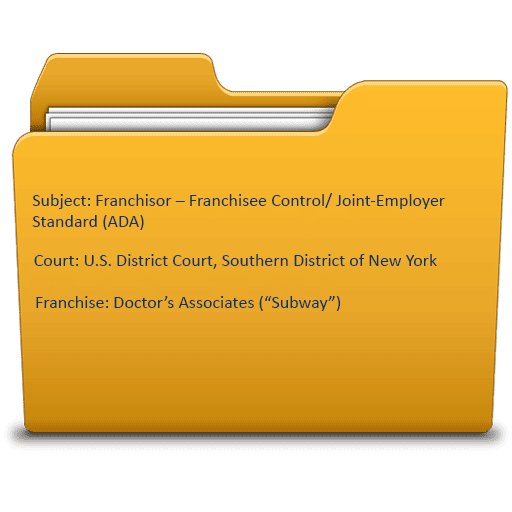
The issue of Franchisor’s liability for Franchisee’s legal obligations has been frequently addressed in cases and commentary throughout this blog. The following case falls in to this Joint-Employer category.
Issue:
Is the Franchisor liable for Franchisee’s violations of the Americans with Disabilities Act (“ADA”)?
Facts:
Plaintiff, who is “profoundly deaf” and whose “first and primary language is American Sign Language” (Complaint) brought an action against the Subway franchise alleging violations of Title III of the ADA, together with analogous provisions of New York state law, and the New York City Human Rights Law.
Plaintiff asserted that the Franchisor was jointly liable for failing to assert sufficient control over its Franchisee to ensure that these laws were obeyed. Specifically, the Plaintiff alleged that the Franchisor, system-wide, failed to adopt and require the installation of technologies that would have improved the accessibility of restaurants for the hearing-impaired. Specifically, the restaurant lacked “order pads, two-way keyboards, order screens, and information screens” that are designed for hearing impaired individuals.
Concerning the incident leading to the lawsuit, the Plaintiff alleged that, “On September 20, 2018, Plaintiff personally visited’ the Restaurant ‘with the intention of buying a steak sandwich.’ The employee in charge of taking orders allegedly ‘noted . . . [t]he fact that Plaintiff was deaf[.]’ ‘Plaintiff pointed to the food on the counter and used hand gestures to indicate that he wanted a steak sandwich.’ The employee allegedly became ‘impatient and angry’ with Plaintiff’s attempt to communicate with hand gestures. ‘The employee used angry hand gestures and aggressive body language when communicating with Plaintiff.”
The Plaintiff went to lengths to establish the extent to which Subway controlled the environment in each of its units, and noted the Operations Manual, which the Plaintiff argued proved that Subway “exercises control over ADA compliance and anti-discrimination employment training of its franchise restaurants throughout the United States.”
Decision:
The Franchisor moved to dismiss the Complaint, which the Court granted.
The Court found compelling that the ADA was enacted to address those who “own, lease, or operate a place of public accommodation,” and the Franchisor did not fall into any of these categories. Plaintiff anticipated this finding, he urged the Court to adopt a different standard; whereby, the ADA would apply to “any party that exerts a ‘significant degree of control’” over the public accommodation. Thus, Plaintiff made the oft repeated, proposed standard aimed at Franchisors.
The Court rejected the argument that the Franchise Agreement or Manual established that Subway controlled the operations, and concluded that, “these are allegations that DAL [Franchisor] has general supervisory authority and thus are insufficient to plead that DAL specifically controls the Restaurant’s accessibility to the disabled.”
The remaining state and city claims were dismissed, as well.
Citation: 2020 U.S. Dist. LEXIS 11562
BE ADVISED that these comments are not intended as legal opinions and are not to be relied upon as legal advice. If you need franchise-related legal advice, please contact us to discuss the specifics of your franchise business.
© KilcommonsLaw, P.C. 2020
Looking for a NJ Franchise Law Attorney?
